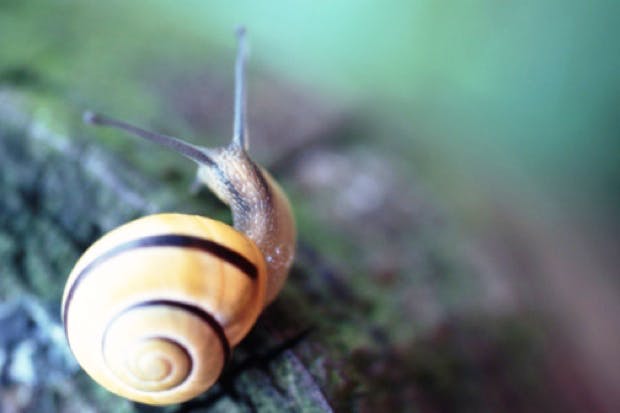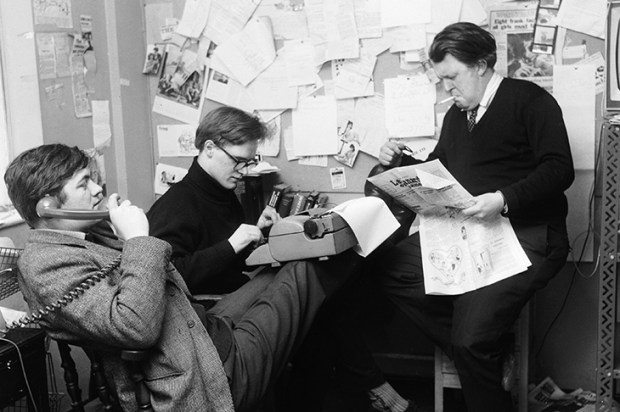‘Well, you’re arguing facts against opinions. OK, I mean, the fact that the amount of carbon dioxide in the air has rocketed up since the Industrial Revolution, and continues to rocket up, is a fact. Now, it’s so much a fact that even the climate change deniers look away from it and don’t deny it.’
— Professor Steve Jones, Feedback, BBC Radio 4, 18 October
Have a look at that last sentence. It represents such a cherishably stupid, rude, fatuous, crabby, bigoted, ignorant, petulant, feeble, fallacious, dishonest and misleading argument that if it turned out the speaker in question was a professor of logic or philosophy you really might want to shoot yourself in despair.
Can you see what the problem is? Let me explain. This angry professor character wants us to believe that there are people called ‘climate change deniers’ who are so far outside the pale of reasonable discourse that even when they are right it’s another sign of just how wrong they are.
Atmospheric CO2 has been rising since the Industrial Revolution, Jones is telling us, but those pesky deniers are so slippery that they refuse to deny this fact. If they did, presumably, it would make Jones’s job a lot easier because then he’d be able to provide a clear example of these wrong ‘opinions’ deniers supposedly hold. Apparently, though, Jones is unable to produce such a clear example. So instead he has to fabricate one and — in the very next breath — to discount it by conceding that actually this is a point on which ‘even’ the ‘deniers’ agree.
Am I being too harsh on Professor Jones? His field is genetics rather than atmospheric physics, so perhaps we shouldn’t be surprised if he sounds here like a rather desperate man flailing well beyond his pay grade. Had he been quizzed on his specialist subjects — drosophila and snails — I expect he would have been absolutely first-rate. We can hardly blame poor Jones the Snail if the BBC asked him to pose as an expert on an area about which he would seem to know less then bugger all, can we? Well yes, actually. I think we rather can.
You see Professor Jones is no common or garden snails expert. He also happens to be the author of a 2011 report for the BBC Trust on the BBC’s science coverage. The report was commissioned partly in response to complaints by those pesky climate ‘deniers’ that they don’t get a fair hearing from an organisation supposedly committed by its Charter obligations to impartiality.
Jones’s report was adamant that they shouldn’t. ‘Denialism’, he argued, is typical of a range of belief systems, such as that ‘AIDS has nothing to do with viruses, the MMR vaccine is unsafe, complex organs could never evolve, or even that the 9/11 disaster was a US government plot.’ The evidence for ‘global warming’ was now so ‘overwhelming’, he concluded, that it would be quite wrong for the BBC to imply that it was a two-sided debate by giving swivel-eyed climate ‘deniers’ airtime.
When the report came out I remember being gobsmacked by its chutzpah. (As too was Christopher Booker, whose magisterial demolition of both Jones’s report and the BBC’s climate coverage generally is well worth reading on the Global Warming Policy Foundation’s website). Here, I’d naively imagined, was the perfect opportunity for the BBC to ’fess up to — and remedy — over a decade’s worth of inexcusably one-sided climate coverage. Instead — in the fine tradition of the Climategate inquiries — it had denied all culpability with a ‘move along, nothing to see here’ snow job.
But that was two years ago, since when there have been many new scientific developments not necessarily to the advantage of the alarmist view so doughtily championed by the likes of Jones the Snail. As Matt Ridley noted with characteristic verve and charm in last week’s Spectator cover story — ‘Panic Over!’ — the case for catastrophic man-made climate change theory grows weaker by the day. Why then, does our biggest media organisation persist in pretending otherwise?
An answer, of sorts, was provided by last week’s edition of Feedback, in which apparently ordinary, typical BBC listeners queued up to complain about World at One’s coverage of the new IPCC report. What had upset them was that the main ‘expert’ quoted by Radio 4 was an Australian ‘denier’ called Bob Carter and not a ‘qualified climate scientist’.
There were several details that Feedback curiously neglected to mention. One was that at least one of those ordinary, typical complainants runs a green energy company. Another is that ‘Bob Carter’, whom it described as a ‘geologist’, is in fact a distinguished professor whose specialist field — marine palaeoclimatology — puts him in a rather better position to comment authoritatively on climate change than, say, some Johnny-come-lately geneticist.
Not, of course, that we should set too much store by the Appeal To Authority. If someone has his facts right on climate change, then he’s still right regardless of whether he’s a geneticist, a marine geologist, or the bastard offspring of Adolf Hitler. If, conversely, he has his facts wrong on climate change then no matter how great his credentials — even if he’s Regius Professor of Global Warming at the University of Climate Change — his facts will remain stubbornly wrong.
Here’s what Professor Carter was quoted saying: ‘Climate has always changed and it always will. There is nothing unusual about the modern magnitudes or rates of change of temperature, of ice volume, of sea level or of extreme weather events.’
Funny, I mused, how not a single one of the experts marshalled by Feedback — not even the great Jones the Snail himself — felt capable of challenging this proposition. Hmm. I wonder why that could be.
Got something to add? Join the discussion and comment below.
Get 10 issues for just $10
Subscribe to The Spectator Australia today for the next 10 magazine issues, plus full online access, for just $10.















Comments
Don't miss out
Join the conversation with other Spectator Australia readers. Subscribe to leave a comment.
SUBSCRIBEAlready a subscriber? Log in